System plans to expand 'Own It' throughout seven-state network
By JULIE MINDA
When Dr. Chad Wadell graduated from medical school about 15 years ago, he says, he felt ready to change the world, and he was impassioned about the prospect of providing healing medical care to his patients.
And while his commitment to providing high-quality care has not waned, at times his passion and enthusiasm for being a physician has. He has experienced bouts of burnout — times when he felt disconnected from his patients.
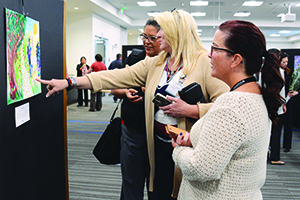
St. Joseph Heritage Healthcare in Southern California's "Own It Gallery Walk" in Anaheim, Calif., shows creative works by caregivers who participated in Own It, the cultural transformation program from Providence St. Joseph Health. St. Joseph Heritage is a medical group associated with the system. St. Joseph Heritage Healthcare
For Wadell, who is a primary care physician with Mission Heritage Medical Group in Mission Viejo, Calif., the necessary but intrusive role of technology has been a culprit. "With the electronic medical record, we're spending lots of time with the computer — in fact we often spend most of our time with the computer, and it's like a hamster wheel," because of the seemingly never-ending list of tasks connected with using the IT system. This can intrude upon the physician-patient relationship.
But about five years ago, Wadell took part in a cultural transformation program called "Own It," from Renton, Wash.-based Providence St. Joseph Health, that he says is helping him feel reinvigorated about his chosen profession. Own It involves in-person learning sessions that help participants reconnect with the healing purpose of their profession, as well as follow-up programming to keep them tapped into what they learned.
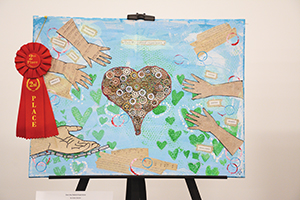
A nurse care manager with St. Joseph Heritage Healthcare based in Anaheim, Calif., submitted this artwork called "Own the Patient Experience," for the Own It Gallery Walk.
St. Joseph Heritage Healthcare
The health system is rolling Own It out to all staff and providers in all of its owned or affiliated medical groups and it plans to open up participation to all staff in the Providence St. Joseph system. That includes clinical and nonclinical staff at Providence St. Joseph hospitals.
Own It starts with a four-hour in-person learning session intended to help participants tap into the reasons they wanted to practice medicine and to connect in a meaningful way with the people they work with. The follow-up programming keeps participants practicing the interpersonal skills and centering skills they've learned.
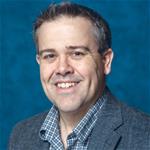
Wadell
Wadell is part of the team that is spreading Own It throughout Providence St. Joseph's seven states. He says, "I will tell you until the cows come home that this is one of the best programs we've had. It improves how we relate to (other physicians), our colleagues and our patients. When we get back to our purpose, it makes each day go better."
Physician burnout
The 2018 "Survey of America's Physicians Practice Patterns and Perspectives" by the Merritt Hawkins physician recruiting firm found that 78 percent of physicians completing the poll had experienced burnout.
According to information from Providence, in addition to the suffering of burned-out employees, clinician burnout can lead to lower patient satisfaction scores and a higher rate of medical errors.
And since burnout also is a concern among other clinicians and for staff outside of the clinical realm, Providence is expanding Own It to these other groups, and tailoring it to their circumstances, says Kevin Manemann, executive vice president and chief executive for Providence's physician enterprise.
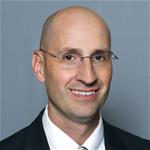
Manemann
Computer v. human
Manemann explains that burnout among physicians and other clinicians is connected in part to the fact that the U.S. health care system has been going through so much change, so quickly — and that change is accelerating over time. Many physicians have moved from private practice to physician groups, and those groups have been acquired by larger organizations. The culture and rules of a large health system are often much different than what the clinicians are used to.
Manemann says many clinicians went into medicine to interact with patients but end up feeling like they're spending most of their time clicking around in electronic medical records in order to meet health care regulations, including the Centers for Medicaid & Medicare Services requirements for "meaningful use" of electronic health record technology.
Wadell says a common and long-standing complaint among doctors is that they are not having the intuitive conversations about the patients' needs that they want to have, because they run out of time during office visits filling mandatory fields on the electronic medical record.
Manemann says Own It sets the stage and gives permission for clinicians and other staff to address the problems that are undermining their satisfaction with their work. It establishes a culture and a context for more positive interactions with peers, and for clinicians and staff to seek more open and more authentic dialogue with one another.
Culture change
Own It began as an initiative to unite the cultures of medical groups merging together under the St. Joseph Heritage Healthcare organization in Southern California. That organization houses physicians practicing at Providence facilities in that region. (California law prohibits direct employment of physicians by hospitals.)
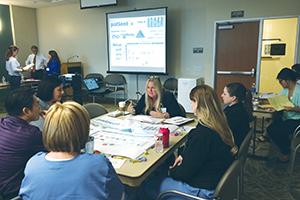
Caregivers at one of St. Joseph Heritage Healthcare's Southern California medical groups meet for an Own It session in Fullerton. St. Joseph Heritage is a physician group associated with Providence St. Joseph Health.
Mission leaders, administrators and executives in charge of operations, nursing leaders, and physician leaders employed by or affiliated with Providence facilitate the Own It sessions. Approximately 30 to 40 physicians and other physician office staff taking part in each session are grouped at tables based on their profession. Manemann says doctors seem more comfortable expressing vulnerability with their peers, and the same holds true for members of other professions.
The content covers Providence's mission, vision and values. It explains what sacred encounters are and how they can be created.
Through presentations, discussion and introspection, Manemann says, participants explore the importance of culture, how their choices either improve or denigrate the atmosphere in the workplace and the whys and hows of taking a mindful perspective on the interactions they have daily in their work. Participants declare their commitment to greet, respect, engage with and assist others, and to help them to their next step in healing.
Participants learn the importance of making meaningful connections even in brief encounters through eye contact, active listening, clear communication, and asking what else one can do to support others.
Connection
Suzi Bruttig, chief nursing officer of Providence's California physician enterprise, was one of the main architects of Own It. She says nurturing human connections can add to an individual's sense of fulfillment at work.
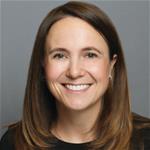
Bruttig
Own It programming also includes "sustainment" activities that physician enterprise sites can tailor to their physicians and staff. This can include department huddles or brown bag lunches where colleagues talk about how they are implementing Own It concepts in their daily work, departments creating recognition programs for those excelling in using the Own It protocols, and departments providing training to model for colleagues behaviors and interactions that contribute to a healthy culture.
More than 1,300 Providence and Providence-affiliated physicians and more than 6,200 Providence and Providence-affiliated staff have taken part in Own It.
Providence has found through surveys that Own It has improved patient and physician satisfaction.
Bruttig says one physician told her that Own It helped bring back the joy and meaning of medicine by giving the doctor permission to establish more personal connections with patients. Manemann says participants have told him that the training has challenged them to examine their interactions and habits and to make changes so that they are engaging in a more positive way with colleagues and patients.
Wadell says many physicians, himself included, arrive to the training as skeptics and depart as fans. "It gets us back to the personal interaction — and after all, that's why we got into this profession. When we get frustrated, we know we can get back to our purpose. And, when we have a purpose, we're less likely to burn out."